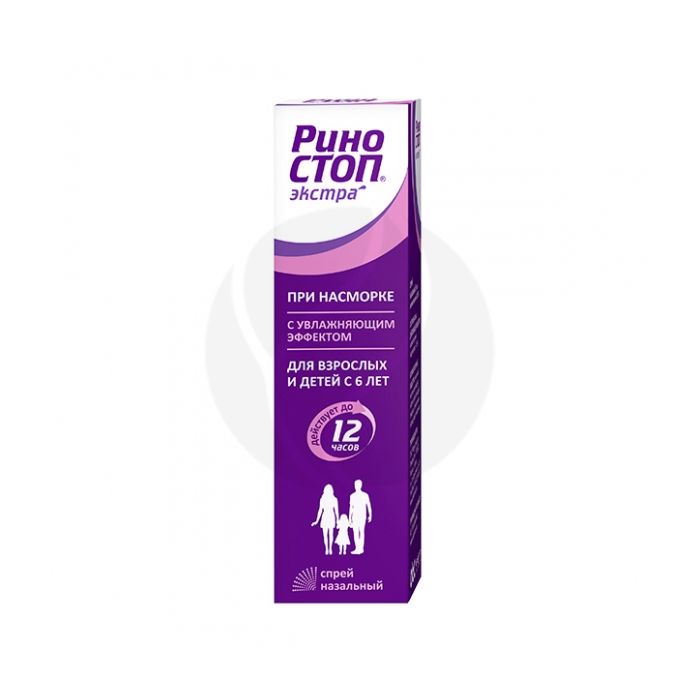Rinostop Extra spray 0.05%, 15ml
Expiration Date: 11/2025
Russian Pharmacy name:
Риностоп Экстра спрей 0,05%, 15мл
Treatment of acute respiratory diseases accompanied by a runny nose;
allergic rhinitis;
vasomotor rhinitis;
to restore drainage in case of inflammation of the paranasal sinuses, eustachitis, otitis media;
to eliminate edema before diagnostic manipulations in the nasal passages.
Intranasally.
Adults and children over 6 years old: 1 injection into each nostril 2-3 times a day.
If symptoms worsen or do not improve within 3 days, you should consult your doctor. In the recommended dose, without consulting a doctor, use for no more than 7 days.
With frequent and prolonged use of the drug, the feeling of 'stuffiness' in the nose may reappear or worsen.
If these symptoms appear, you should stop treatment and consult a doctor.
1ml contains:
Active substance:
Oxymetazoline hydrochloride - 0.5 mg.
Excipients: Citric acid monohydrate - 0.609 mg; sodium citrate dihydrate - 3.823 mg; glycerol - 24.348 mg; benzalkonium chloride - 0.15 mg; purified water - up to 1 ml.
Hypersensitivity to drug components;
atrophic (dry) rhinitis;
angle-closure glaucoma;
condition after transsphenoidal hypophysectomy;
surgical interventions on the dura mater (in history);
children under 6 years of age.
Carefully
With increased intraocular pressure, chronic heart failure, arterial hypertension, angina pectoris; arrhythmias; chronic renal failure; in patients with prostatic hyperplasia with clinical symptoms (urinary retention); severe atherosclerosis; with hyperthyroidism; diabetes mellitus; pheochromocytoma; tachycardia; therapy with monoamine oxidase (MAO) inhibitors (including in the period up to 14 days after their cancellation / during the previous 2 weeks and within 2 weeks after their cancellation) and tricyclic antidepressants, as well as other drugs that increase arterial pressure; porphyria.
Pharmacodynamics
Oxymetazoline belongs to the group of local vasoconstrictor agents (decongestants) with alpha-adrenomimetic action, causes narrowing of the blood vessels of the nasal mucosa, thus eliminating edema and hyperemia of the nasopharyngeal mucosa.
When applied topically to the inflamed mucous membrane of the nasal cavity, it reduces its swelling and the accompanying hypersecretion of mucus (nasal discharge), which facilitates the drainage of the nasal passages. Restores nasal breathing.
Elimination of edema of the nasal mucosa helps to restore aeration of the paranasal sinuses, middle ear cavity, which reduces the likelihood of bacterial complications (sinusitis, sinusitis, otitis media).
With local intranasal application in therapeutic concentrations, it does not irritate and does not cause hyperemia of the nasal mucosa.
The drug begins to act quickly, within a few minutes. The duration of the drug is up to 12 hours.
Pharmokinetics
With local intranasal administration, oxymetazoline does not have a systemic effect. The half-life of oxymetazoline with its intranasal administration is 35 hours. 2.1% of oxymetazoline is excreted in the urine and about 1.1% in the feces.
Overdose
Clinical signs of intoxication with imidazole derivatives can be nonspecific and indistinct, since the phases of hyperactivity are replaced by phases of depression of the central nervous system, cardiovascular and respiratory systems.
Symptoms: anxiety, restlessness, hallucinations, seizures, decreased body temperature, lethargy, drowsiness, coma, narrowing or dilated pupils, fever, sweating, pallor, cyanosis, palpitations, bradycardia, arrhythmias, cardiac arrest, increased blood pressure, decreased blood pressure , nausea, vomiting, respiratory depression, respiratory arrest.
In children, an overdose can cause the development of symptoms from the central nervous system, such as agitation, convulsions, coma, bradycardia, respiratory arrest, as well as an increase in blood pressure, followed by a possible decrease in blood pressure.
Treatment: gastric lavage, intake of activated carbon (in case of accidental ingestion of the drug); symptomatic.
In case of severe overdose, intensive therapy is indicated in a hospital setting. The use of vasoconstrictors is contraindicated.
In case of overdose, consult a doctor.
Side effects
Immune system disorders:
Uncommon: hypersensitivity reactions (angioedema, exanthema, pruritus).
Gastrointestinal disorders:
Rarely: nausea.
Nervous system disorders:
Rarely: headache, dizziness, anxiety, irritability, sleep disturbance (in children), insomnia.
Very rare: fatigue, drowsiness, anxiety, hallucinations, convulsions.
Heart disorders:
Rarely: increased blood pressure, palpitations, tachycardia.
Respiratory, chest and mediastinal disorders:
Uncommon: burning or dryness of the mucous membranes of the nasal cavity, sneezing, nosebleeds.
In rare cases: after the effect of the drug has passed, a feeling of 'stuffiness' in the nose (reactive hyperemia).
Very rare: respiratory arrest (in infants).
Visual disorders:
Rarely: visual impairment (by eye contact)
Long-term continuous use of vasoconstrictor drugs can lead to tachyphylaxis, atrophy of the nasal mucosa, and recurrent edema of the nasal mucosa (rhinitis medicamentosa).
If any of the side effects indicated in the instructions are aggravated or you notice any other side effects not listed in the instructions, inform your doctor.
Special conditions
Glycerol, which is part of the excipients of RinostopЃ Extra, has the property of binding and retaining water, which contributes to additional hydration of the nasal mucosa.
Avoid contact with eyes.
In order to avoid the spread of infection, it is necessary to use the drug individually.
Do not exceed the maximum periods and recommended doses when using the drug alone. If there is no decrease or if the symptoms of the disease worsen, you should consult a doctor.
Influence on the ability to drive vehicles and mechanisms
After prolonged use of remedies for the common cold containing oxymetazoline, in doses exceeding the recommended ones, a general effect on the cardiovascular system and the central nervous system cannot be ruled out. In these cases, care should be taken when driving vehicles and engaging in other potentially hazardous activities that require increased concentration of attention and speed of psychomotor reactions.
Drug interactions
The drug slows down the absorption of local anesthetic drugs, lengthens their action.
With simultaneous use with monoamine oxidase inhibitors (within the previous 2 weeks and within 2 weeks after their withdrawal), tricyclic antidepressants or other drugs that increase blood pressure, an increase in blood pressure may be observed.
The co-administration of other vasoconstrictor drugs increases the risk of side effects.

